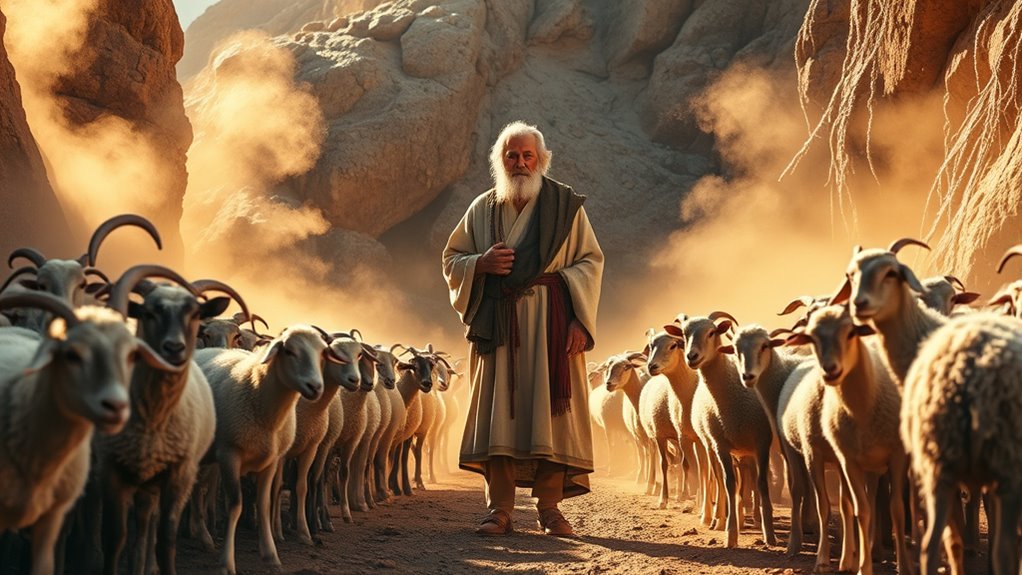In the Sheep and Goats judgment, Jesus teaches that your actions of compassion and mercy reveal your true character. If you serve others, especially those in need, you align with what God values and demonstrate genuine faith. Neglecting those in hardship reflects a selfish heart. This parable reminds you of divine accountability, showing how acts of love or indifference impact your eternal destiny—if you want to understand how it all fits together, keep exploring these powerful lessons.
Key Takeaways
- The Sheep and Goats Judgment, based on Matthew 25:31-46, symbolizes the final divine assessment of actions and motives.
- Sheep represent those who demonstrate compassion and service, aligning with divine will; goats symbolize neglect and selfishness.
- Genuine acts of mercy and kindness reflect true faith and are rewarded, while neglecting others leads to separation.
- The judgment emphasizes personal accountability, where actions reveal true heart conditions and moral responsibility.
- Reflecting on daily priorities and actions helps individuals align with divine standards for eternal judgment.
The Biblical Context of the Sheep and Goats Passage

The Sheep and Goats passage is rooted in the teachings of Jesus found in Matthew 25:31-46, where He describes the final judgment. To understand this passage, you should consider its historical background, which reflects first-century Jewish expectations of divine justice. During that time, cultural interpretations of righteousness often emphasized caring for the vulnerable, like the poor and hungry. This context helps clarify why Jesus uses sheep and goats as symbols: sheep represent those who serve others, while goats symbolize neglect. The setting aligns with Jewish eschatological ideas about God’s judgment at the end of days. Recognizing these cultural nuances allows you to see how Jesus’s message would resonate deeply with His original audience, emphasizing justice and compassion as central themes.
Jesus’ Teachings on Final Judgment

Jesus teaches that the final judgment will clearly distinguish those who live according to God’s will from those who neglect it. He emphasizes that actions rooted in compassion and mercy reflect genuine faith. Cultural influences shape how people interpret these teachings, sometimes emphasizing justice or morality differently across societies. Historical interpretations vary, with some viewing the judgment as literal, others as symbolic. Despite these differences, Jesus underscores personal accountability and the importance of caring for others. His teachings challenge you to reflect on your deeds, showing that true faith manifests through acts of kindness. Ultimately, the judgment reveals whether you have genuinely followed God’s will, beyond cultural or historical perspectives. It’s about aligning your life with divine principles, demonstrated through love and service.
The Criteria for Separation: Acts of Compassion and Mercy

Your actions of compassion and mercy are key indicators of your true character. When you care for those in need, you’re demonstrating the kindness that separates the sheep from the goats. These acts become the basis for the final judgment, revealing your genuine love for others.
Compassionate Actions Evident
Acts of compassion and mercy serve as clear evidence of genuine faith and readiness for the coming judgment. When you care for others, you’re demonstrating true devotion. These acts include showing kindness through practical actions that reflect love and concern. You might:
- Provide for the hungry or homeless, embodying mercy
- Care for animal welfare, ensuring creatures are protected and valued
- Practice environmental stewardship, safeguarding God’s creation
Your actions reveal your heart’s alignment with divine principles. Genuine compassion extends beyond words—it’s shown through tangible efforts that uplift others and protect the vulnerable. By actively engaging in these acts, you prepare yourself for the judgment, proving your faith is alive and sincere. Remember, these compassionate deeds are the criteria that distinguish the sheep from the goats.
Mercy as a Criterion
Genuine faith manifests through acts of mercy that reveal the true condition of your heart. When you show compassion, you reflect a deep understanding of animal ethics and environmental stewardship, recognizing your responsibility toward all creation. Mercy isn’t just about human kindness; it’s about caring for vulnerable beings, whether animals or the planet. Your acts of mercy—feeding the hungry, caring for the oppressed, protecting endangered species—serve as a criterion for true separation. These deeds demonstrate your sincerity in living out faith through tangible compassion. By prioritizing mercy, you align your actions with God’s standards, proving that your faith extends beyond words into meaningful service. Ultimately, acts of mercy reveal whether your heart is truly transformed and aligned with divine purpose.
Symbolism of the Sheep and Goats in Biblical Literature

In biblical literature, the sheep and goats symbolize contrasting moral and spiritual qualities, often representing the righteous and the unrighteous. This animal symbolism draws heavily on pastoral imagery, where shepherds tend to their flocks, emphasizing care, guidance, and moral judgment. The sheep, seen as gentle and obedient, embody innocence and faithfulness, while the goats, often stubborn and independent, symbolize defiance and moral failings. Recognizing these symbols helps you understand the deeper lessons about obedience and moral integrity.
- Sheep evoke images of peaceful pastures, highlighting purity and trust.
- Goats symbolize wilderness and independence, signifying testing and moral challenge.
- The pastoral setting underscores the divine role of shepherds in moral guidance and judgment.
The Significance of Serving Others in Christian Faith

Serving others holds a central place in Christian faith because it reflects the love and compassion that Jesus demonstrated throughout his life. When you actively serve, you practice a essential spiritual discipline that demonstrates your commitment to living like Christ. This acts as a tangible expression of faith, showing that you genuinely care for others’ needs. Your acts of kindness and service are not just about helping people—they also hold eternal significance, as they can lead to heavenly rewards. Jesus emphasizes that serving others is integral to your spiritual journey, shaping your character and aligning your actions with God’s will. Through consistent service, you demonstrate your devotion and prepare yourself for the ultimate judgment where your deeds will be recognized.
The Role of Faith and Works in Salvation

Faith and works together form the foundation of your salvation, illustrating that belief in Christ must be reflected through actions. Many ask about faith versus works and how they relate to the salvation criteria. It is crucial to understand that genuine faith naturally produces good deeds, not as a requirement for salvation but as its evidence. True faith in Christ leads to a life marked by compassion, obedience, and service. You should recognize that:
- Faith is the initial step that grants you access to salvation
- Works demonstrate your authentic commitment and love for God
- Both elements work together, not in opposition, to fulfill God’s plan for you
Practical Implications of the Judgment Parable for Believers

The judgment parable offers clear guidance on how believers should live daily, emphasizing that their actions reveal the authenticity of their faith. The sheep symbolism highlights acts of compassion and service, showing that genuine faith influences your daily choices. When you help those in need, you demonstrate true obedience and align with God’s will. Conversely, the goats symbolism warns against neglecting these responsibilities, indicating a superficial faith. Recognizing this, you’re encouraged to live intentionally, showing kindness and mercy in practical ways. Your daily actions serve as evidence of your devotion and integrity. This parable urges you to reflect on how your behavior aligns with Christ’s teachings, reminding you that faith without works is incomplete. Your consistent actions shape your spiritual future and testify to your genuine relationship with God.
The Divine Perspective on Human Actions

From God’s divine perspective, human actions are seen as more than just outward behaviors—they reveal the true condition of your heart and intentions. Sheep symbolism emphasizes acts of compassion, kindness, and humility, reflecting genuine faith. Conversely, goat symbolism highlights selfishness, pride, and neglect of others. God observes not only what you do but why you do it, recognizing authentic love versus superficial gestures.
- Genuine acts rooted in mercy and humility resonate with divine approval
- Selfish motives marked by pride and indifference are exposed as insincere
- The heart’s true nature, whether sheep-like or goat-like, is revealed through your actions
Themes of Accountability and Divine Justice

You are held accountable for your actions, and the judgment reflects your moral responsibility. Divine justice guarantees that fairness prevails, weighing deeds with perfect accuracy. This theme reminds you that accountability is an essential part of divine fairness.
Moral Responsibility in Judgment
Understanding moral responsibility in judgment involves recognizing that divine justice evaluates not only actions but also intentions and choices. Your free will allows you to navigate moral dilemmas, shaping your accountability. When facing difficult decisions, you must consider the following:
- How your intentions reflect your character
- The choices made despite competing options
- The role of moral dilemmas in testing your integrity
You’re responsible for your decisions, even in complex situations. Recognizing this helps you see that divine justice isn’t just about what you do but why you do it. Your moral responsibility encompasses both your actions and the underlying motives, emphasizing the importance of genuine intent when standing before divine judgment.
Divine Fairness Revealed
Divine fairness becomes clear when examining how accountability is enforced in judgment. The animal symbolism of sheep and goats vividly illustrates eschatological themes of justice, where each individual’s actions determine their fate. Sheep, symbolizing those who act compassionately and righteously, are rewarded, while goats, representing neglect and selfishness, face separation. This imagery emphasizes that divine justice is impartial, rooted in moral responsibility. The judgment scene underscores the idea that divine fairness isn’t arbitrary; it reflects a perfect balance of accountability. As you witness this, it’s evident that divine justice aligns with ethical conduct, reinforcing the belief that everyone’s deeds are weighed fairly in the end. The symbolism highlights that divine fairness is rooted in truth, mercy, and unwavering justice.
Reflecting on Personal Life and Spiritual Priorities

Reflecting on personal life and spiritual priorities encourages an honest assessment of how your daily choices align with your faith and values. By practicing spiritual discernment, you can identify areas where your actions reflect compassion, humility, and service. This reflection helps you stay focused on what truly matters—earning heavenly rewards through genuine kindness and selflessness. Consider questions like:
Reflect on your daily choices to align actions with faith, compassion, humility, and eternal values.
- Are my actions demonstrating Christ’s love?
- Do I prioritize eternal values over temporary pleasures?
- How can I better serve others in my daily routines?
Taking time to evaluate these aspects guides you toward living intentionally, aligning your priorities with God’s purpose. It’s a crucial step in preparing for the judgment, ensuring your life reflects your faith and pursuit of spiritual growth.
Frequently Asked Questions
How Does the Sheep and Goats Judgment Relate to Other Eschatological Teachings?
You see, this judgment highlights divine justice and moral accountability, emphasizing how your actions reflect your faith. It relates to other eschatological teachings by illustrating that everyone will be held answerable for their deeds. This connection underscores the importance of living morally, knowing that your choices have eternal consequences. Ultimately, it reminds you that divine justice ensures fairness, and moral accountability guides your life toward righteousness, aligning with broader eschatological promises.
What Cultural Influences Shaped the Imagery Used in the Parable?
You see, cultural influences like agricultural imagery and cultural symbolism shape the vivid imagery in the parable. You notice that sheep and goats symbolize different groups, reflecting societal roles and values. These images draw from familiar farm life, making the message more relatable. By using agricultural imagery, the parable connects spiritual truths to everyday life, helping you understand the importance of compassion and judgment through culturally meaningful symbols.
How Do Different Christian Denominations Interpret This Passage?
Did you know that over 33,000 Christian denominations interpret scripture differently? When it comes to this passage, you’ll find diverse theological interpretations and doctrinal differences shaping each viewpoint. Some see it as a literal future event, emphasizing salvation through good works, while others interpret it metaphorically, focusing on compassionate action. These varied perspectives reflect each denomination’s unique theological framework, influencing how followers understand judgment and morality.
Are There Historical Examples of Societies Applying This Judgment Concept?
You might wonder if societies have historically applied ideas of judgment to promote justice and morality. Throughout history, various cultures and religious communities have implemented practices resembling this concept, like public punishments or moral evaluations. These actions aimed to reinforce societal morality and uphold justice, reflecting an understanding that accountability and moral discernment are essential for social cohesion. Such examples show how the idea of judgment influences societal behavior over time.
How Can Believers Practically Prepare for This Final Judgment?
You can prepare for the final judgment by living faithfully and practicing compassionate service daily. While worldly pursuits often focus on material gains, remember that eternal rewards come from acts of kindness and unwavering faith. By aligning your actions with these principles, you strengthen your spiritual readiness. Stay vigilant, nurture your relationship with God, and serve others sincerely—these steps help you stand confident when the ultimate moment arrives.
Conclusion
As you stand before the divine scale, imagine your actions as gentle sheep or stray goats, each representing your choices to serve or neglect others. The judgment highlights that acts of compassion light a path toward grace, while indifference darkens it. Reflect on your daily life—are you tending to the lonely and hurting? Remember, your kindness paints your spiritual landscape, shaping your eternal destiny amid the radiant fields of God’s justice and mercy.










